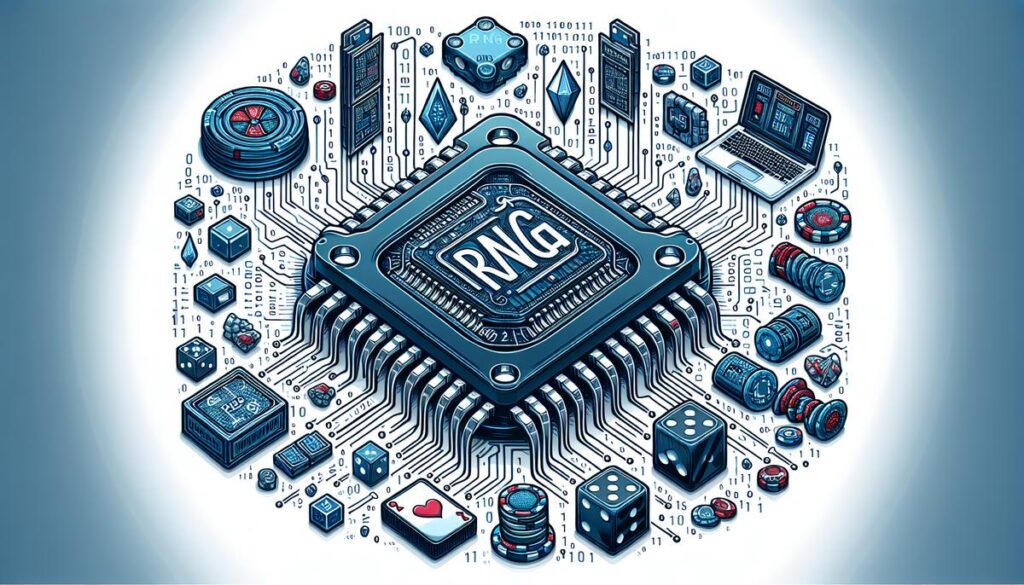Understanding RNGs: The Technology Behind Fair Online Gaming
In the buzzing world of online gambling, one term you’ll frequently encounter is RNG—short for Random Number Generator. This critical piece of technology lies at the heart of every online casino game, ensuring each spin of the reel, roll of the dice, or shuffle of the card deck remains fair and unpredictable. But what makes RNGs tick, and why are they so revered in the realm of online gaming? Here’s a closer look at the technology and its importance in ensuring a fair gaming experience.
What is an RNG?
A Random Number Generator, or RNG, is a sophisticated algorithm designed to produce a sequence of numbers that lack any discernible pattern. In other words, it generates outcomes that are entirely random. In the context of online casinos, RNGs are used to ensure the outcomes of games are fair and unpredictable, simulating the natural randomness found in traditional, physical casino games.
For instance, when you spin the reels in an online slot game, the RNG determines the symbols that appear on your screen. This same principle applies to online card games, where the RNG handles the shuffling and dealing of cards. The beauty of the RNG lies in its ability to maintain the integrity of the game by ensuring that neither the player nor the casino can predict or manipulate the outcome.
Types of RNGs in Online Gaming
Not all RNGs are created equal, and understanding the distinction between the types can provide better insight into how they operate.
**Pseudo-Random Number Generators (PRNG):**
PRNGs are the most common type of RNG used in online gambling. Rather than relying on physical processes to generate randomness, PRNGs use mathematical formulas or algorithms to produce long sequences of random numbers. While they are not truly random, they are sufficiently unpredictable for the purposes of online gaming. The sequences are initiated with a seed value, which is a fixed number that PRNGs use as a starting point. Despite their artificial nature, PRNGs are incredibly efficient and can produce a high level of randomness essential for fair gameplay.
**True Random Number Generators (TRNG):**
True Random Number Generators take randomness to a whole new level by deriving numbers from physical phenomena, such as electronic noise or radioactive decay. These processes are inherently unpredictable, offering genuine randomness. However, TRNGs are less commonly used in online gaming due to their complexity and the requirement for specialized hardware. Despite this, some high-end gaming platforms might utilize TRNGs to guarantee an extra layer of fairness and authenticity in their games.
The Importance of RNGs in Fair Gaming
The primary role of an RNG in online gaming is to ensure fairness and maintain the credibility of the platform. Here’s why RNGs are indispensable:
**Ensuring Unpredictability:**
One of the critical aspects of fair gaming is unpredictability. Players need to feel confident that each spin or deal is unique and independent of previous outcomes. RNGs achieve this by producing random sequences that are impossible to forecast. This element of surprise keeps the game engaging and prevents patterns that could be exploited.
**Preventing Manipulation:**
Fairness in online gaming is not just about randomness; it’s also about preventing manipulation. Without RNGs, it would be possible for malicious players or even the casino itself to alter game outcomes. RNGs, especially when regularly tested and certified by independent auditors, ensure that no one can tamper with the results, maintaining a level playing field for all participants.
**Regulatory Compliance:**
For online casinos to operate legally and ethically, they must adhere to stringent regulations that often mandate the use of certified RNGs. Regulatory bodies, such as the Malta Gaming Authority (MGA) or the UK Gambling Commission (UKGC), require regular audits to ensure RNGs are functioning correctly. Compliance with these standards is crucial for retaining licenses and building trust among players.
Testing and Certification of RNGs
The implementation of an RNG is not a set-it-and-forget-it process. To guarantee ongoing fairness and transparency, RNGs undergo rigorous testing and certification processes conducted by third-party auditors. These audits assess the randomness and unpredictability of the RNG’s outputs.
**Independent Testing Agencies:**
Trusted agencies like eCOGRA, iTech Labs, and GLI (Gaming Laboratories International) specialize in testing casino RNGs. They use advanced statistical methods to evaluate whether the RNG produces genuinely random results over extensive periods. A certification from these agencies serves as a seal of approval, assuring players of the game’s integrity.
**Periodic Audits:**
Regular audits are another critical aspect of maintaining fair play. Independent auditors frequently test the casinos’ RNGs to detect and rectify any anomalies that might arise over time. These audits help maintain a consistent standard of fairness and build ongoing trust with the player base.
Random Number Generators are the unsung heroes of the online gambling world, guaranteeing that every game is played fairly and without interference. By understanding and appreciating the role of RNGs, players can approach online gaming with a greater sense of confidence and security. As the industry continues to evolve, the technology behind RNGs will undoubtedly advance, ensuring even more robust mechanisms for maintaining fairness and unpredictability in online gaming.

